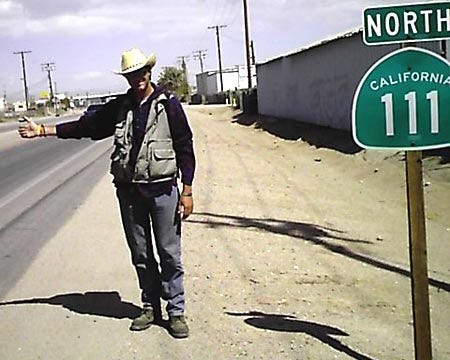Nomadics
Tools for Possibilities: issue no. 26
Once a week we’ll send out a page from Cool Tools: A Catalog of Possibilities. The tools might be outdated or obsolete, but the possibilities they inspire are new. Sign up here to get Tools for Possibilities a week early in your inbox.

Hitchhiking encouragement
This a website promoting hitchhiking. You didn’t used to need a website to hitchhike, only a thumb and pulse. I’ve spent a lot of time standing by the side of the road with my thumb out, and it led to some of the best days of my life. Times are different now.
What this site offers is mostly encouragement. Stories of other hitchhikers having a blast, reassurances that hitching is safe and legal, and suggestions about where in the world the natives are friendly to hitchers.
If you’ll hitch, I’ll pick you up. — KK
- Isn’t hitchhiking illegal in many areas? The short answer is: no.
- Hitchhiking is not as popular in North America as it was 30 years ago, but it is still legal if one follows the laws of each state. Also, hitchhiking is still a viable mode of transportation in many other areas around the world, including Europe, parts of Asia, Africa, Australia, etc.
- The most common law related to hitchhiking in the United States has been established in the Uniform Vehicle Code (UVC). It states:No person shall stand in a roadway for the purpose of soliciting a ride.What many people fail to realize is that a roadway is defined (in the same UVC) as:That portion of a highway improved, designed or ordinarily used for vehicular travel, exclusive of the sidewalk, berm or shoulder even though such sidewalk, berm or shoulder is used by persons riding bicycles or other human powered vehicles.As you can see, the law only states that hitchhikers cannot stand in a driving lane (good idea, huh?), but they can stand on the shoulder or sidewalk of a road. A further code mentions that US States have the right to restrict pedestrians (i.e. hitchhikers) from entering certain highways (interstate routes, for example), but must post a sign if this is the case. What it all boils down to is this. Hitchhiking is not only possible in the US, but also legal. Many US States have adapted the above code to their own liking, though keeping a similar wording. You can research more about current hitchhiking-related laws in the digihitch USA section.
- I held up a sign in Japanese: “Kaze o fuku mama, ki no mukoo mama,” loosely translated to mean: “Wherever the wind blows, so too will my feelings take me.” A folk singer I met thought it would be funny if I tried hitchhiking displaying this old song lyric. It was funny. So funny, in fact, people stopped their cars to take pictures of me, and then drove away.
- I had been stuck at an entrance ramp for hours [in Belgium]. I was joined by a six foot five fellow hitchhiker carrying what looked like a body bag. A car stopped for us, and the woman inside hit the button to lower the passenger side window. She peered out of the opening at us. “Are you dangerous?” I shrugged my shoulders and said “Not me,” turning to my fellow hitchhiker, “Are you?” “No.” She let us into the car. She was a child psychologist, specializing in abnormal psychology, claiming she could tell by our body language during the response that we were, indeed safe.
- During the past fifteen years I’ve hitchhiked through over a dozen countries, spending months at a time begging rides. Everyone from grandmothers to soccer hooligans have stopped for me. Rebels pick me up to bond with a fellow outlier of the system, while law and order types give rides to keep me from harm, or to make sure I cause none. I’ve been treated to steak dinners, been given free lodging, plenty of free advice and even some cash. I’ve slept in driver’s mansions, in rest stops, and in road side culverts. I’ve traveled at 150mph with an executive in a new Mercedes across the German autobahn, and I’ve limped through the hills of central Japan in a sputtering Toyota van with a Japanese rhythm and blues band.

Best gateway to hostels
Hostels range in price but they are usually the cheapest lodging option in most cities. You can often find a bed in mega-cities for less than $20. A hostel has very little to do with youth, although there is still a network of official youth hostels, which anyone of any age can use. A hostel is simply a hotel where you sleep in a shared bedroom, or a dorm, instead of a private room. Shared facilities mean cheap digs. (The exception is South and Southeast Asia where private rooms are as cheap as hostels). Hostels also often have a shared kitchen which residents can use. This means hostels are very social places with lots of interaction between travelers.
Cool Tools previously reviewed the hostel booking site Hostels.com, but that site has fallen a bit behind the times after a change in ownership. Much better these days, with thousands of more hostels in their database, and a lot more friendly mojo, is Hostelz. It is the most complete and useable portal for global hostelling.
Started by a backpacker, the web site Hostelz list some 22,000 hostels and guest houses around the world. They encourage independent reviews by users and don’t censor negative reviews. In addition, they hire backpackers $7 to officially review hostels for the site. Hostelz graciously provides you with the complete contact and location information of each hostel so you can book a room yourself. But Hostelz also provides the option to book a room through them at the same price. Since they do not charge hostels to be listed, this booking option provides their only income, which so far is enough to keep the site going.
Hostels are a great, often overlooked resource, and Hostelz is your best bet for finding one. — KK

Cheapest homestays
I travel a lot. I hope to never book a hotel room again. I stay in people’s homes, arranged either by couchsurfing or Airbnb.
While I was traveling through Europe as a student I got tired of staying with other American travelers in hostels. I was looking for a more authentic and local experience so I began to stay in homes through Couchsurf.com. Over the years I’ve stayed in about 25 homes. Once you sign up you can search for locations and hosts with similar philosophy, interests, and traveling tendencies. There is no payment for sleeping on whatever couch/bed/futon is provided. To show my gratitude I make it a rule to cook a meal for my hosts. I’ve also reciprocated the generosity by hosting couchsurfers in my homes. CS runs on trust, interests and positive reviews. Since there is no payment, the main reason to join is to meet like-minded people who have stories and camaraderie to share. As long as you have a detailed profile, you will attract and find people with similar interests. Being a female traveler has never been an issue since I normally travel with a friend, or I choose to stay with primarily female hosts. I have met some of my best travel companions and friends through CS. You can find couchsurfing all over the world now.
Now that I am working I can also use Airbnb. Airbnb offers an elegant interface and large database of ordinary to extraordinary places to stay all around the world, at a reasonable price. The service they offer is the curation of unique places, as well as increased security. Part of why some people will stay in an Airbnb and not a couch on CS is because Airbnb treats security as its primary financial and legal liability. Airbnb offers a 24-hour hotline, secure payment platform, identity verification, verified photographers and profile reviews. They also show whether you have mutual friends with the host, which makes me more inclined to stay with them. I’ve discovered some unbelievably beautiful and unique places that I otherwise would never have had access to at a price lower than a conventional hotel, almost by two or three fold ($50 vs. $100-150).
Both CouchSurfing and Airbnb offer “local experiences” and a more affordable way to travel. However, CS requires more of a commitment to engage with your host (share stories, eat a meal together) in exchange for free board vs. Airbnb, which requires payment yet is more luxurious and less personal. Think of it as the difference between getting a ride in a taxi (Airbnb), vs. from a rideshare (Couchsurf). In the cab you sit in the back and you don’t need to talk to the driver if you don’t want to, while the rideshare is more intimate so you sit up front and chat.
When deciding which service I want to use, I always ask myself: Do I want surprise or security? CS always surprises me with interesting people and stories, while Airbnb offers local luxury at an affordable price. — Ting Kelly
03/20/23





